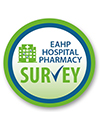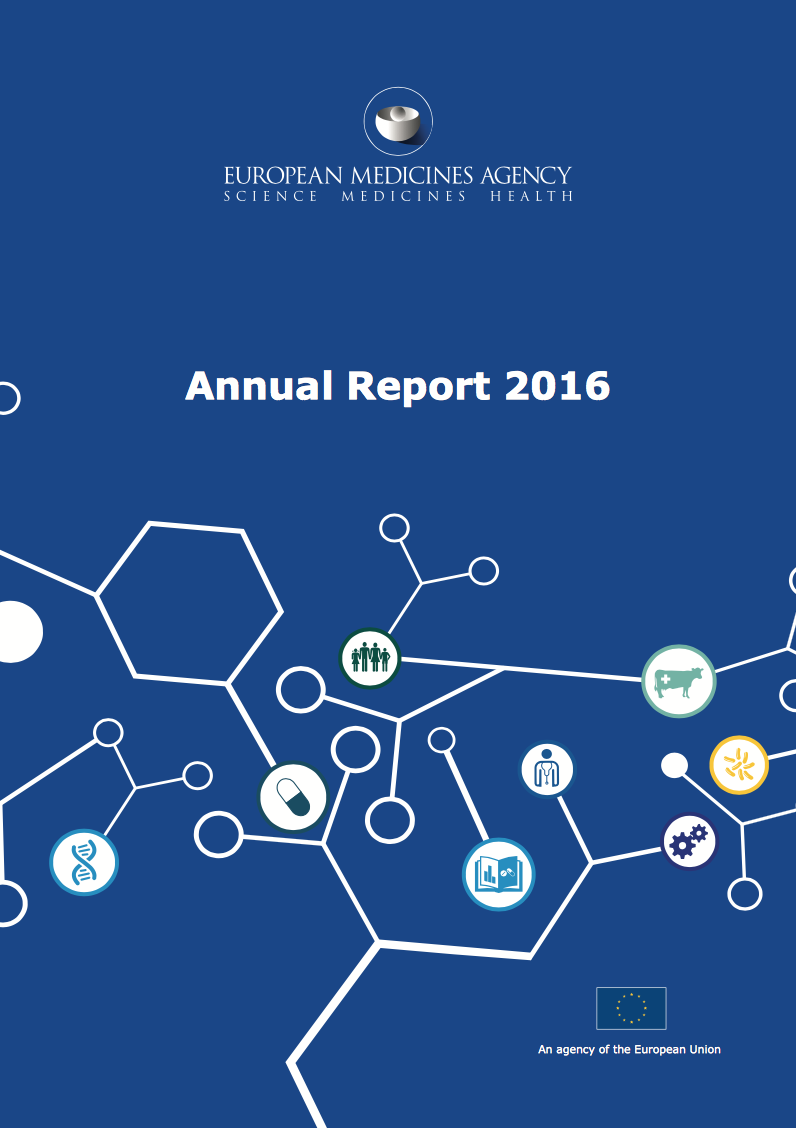 The EAHP EU Monitor is a regular round up of news relevant to hospital pharmacy in Europe.
The EAHP EU Monitor is a regular round up of news relevant to hospital pharmacy in Europe.
You can subscribe to receive the EAHP EU Monitor by email HERE.

EJHP: Article on the EAHP European Statements survey 2015
May’s edition of the European Journal of Hospital Pharmacy (EJHP) includes an original article on the 2015 European Association of Hospital Pharmacists (EAHP) Statements survey. It is the first survey of the new EAHP line providing general knowledge on the baseline implementation level of the European Statements of Hospital Pharmacy in all six sections of the Statements.
The original article analyses the survey results relating to sections 2, 5 and 6 of the Statements. In addition to collecting data on implementation, the survey also identified the most important barriers to and the drivers of Statement implementation. It showed that Statements related to the publication of research activities, the creation of contingency plans for medicine shortages, the implementation and use of computer supported decision tools, the involvement in developing local and national guidelines/policies and the identification of priorities for improvement in medicines use process are areas in which hospital pharmacies have difficulties.
Insufficient capacity and different priorities of hospitals and health system managers were identified as the most important barrier to Statement implementation.
The article is available HERE
More information on the results of the 2015 EAHP Statements survey is available HERE
.jpg)
New publications on medicines shortages
FIP – Overview of models for reporting medicines shortages
The International Pharmaceutical Federation (FIP) has published an overview of models for reporting medicines shortages. The report, which is intended to support the implementation of the World Health Assembly Resolution on “Addressing the global shortage of medicines and vaccines“, indicates that global medicines shortages have worsened.
The analysis underlying the report involves systems operated by Australia, Canada, the Netherlands, South Africa, Slovakia and the United States. It compares and contrasts features such as the scope of the shortages listed, the criteria applied (such as the predicted duration of a shortage) and the sources of information used by the eight different reporting systems. Out of the six countries both Slovakia and the United States are currently operating two separate systems.
By sharing best practices the report aims on the one hand at guiding the development and improvement of shortages reporting in both countries that have a system in place as well as in countries which are currently developing one. On the other hand, it raises awareness of the importance to detect and understand the causes of medicines shortages world-wide.
The report is available HERE
EIU – Report on cancer medicines shortages
The Economist Intelligence Unit (EIU) published a report on cancer medicine shortages in Europe which discusses the causes contributing to shortages of oncology medicines and provides policy recommendations. The study underling the report was supported by the European Society for Medical Oncology (ESMO).
Patient care is significantly impacted by medicines shortages as it increases the potential for error or adverse events, brings about the need to use less desirable alternative products or even leads to the failure or delay in treatment. Thus, EIU was commissioned by ESMO to investigate the impact of cancer medicines shortages in Europe.
The research team performed a review of academic and grey literature to explore the impact of medicines shortages on the provision of care and to identify mitigation solutions as well as ways to prevent shortages. In addition, the research team discussed selected policy initiatives with a panel of experts. The European Association of Hospital Pharmacists’ (EAHP) Immediate Past President Roberto Frontini was part of the expert panel.
One of the studies used for the development of the policy recommendations was EAHP’s survey on medicines shortages which listed cancer drugs as the class of medicines that is most likely to be affected by shortages. Based on the findings of the research team, the report proposes the following policy recommendation:
- Introduce legislation for early notification requirements for medicines shortages;
- Establish strategic plans for medicines shortages;
- Develop catalogues of shortages;
- Develop essential medicines lists and assess the risk for shortages;
- Introduce incentives for production infrastructure improvements; and,
- Establish procurement models designed to prevent medicines shortages.
The report concludes by stating that research on the topic has overall been challenging due to key information gaps relating to the lack of data on shortages, patient impact, and causes of shortages as well as the lack of awareness and accountability.
The report on cancer medicines shortages is available HERE

Mid-term review of the digital single market strategy
The European Commission recently published the mid-term review of the digital single market strategy. The review takes stock of what has been achieved and outlines further actions that should be taken in the key areas cybersecurity, data economy and online platforms.
The document also addresses the transformation of health and care. It puts emphasis on the impact that digital health technologies have on citizen’s health, particularly by highlighting advantages such as improving access to care and contributing to the sustainability and resilience of healthcare systems. Further advancement of initiatives in the health sector is however necessary. This includes supporting the development of a secure data infrastructure to pool health data to further research, disease prevention and personalised health and care; fostering cooperation on European level to accelerate the large-scale adoption of innovative solutions such as telemedicine and mobile health applications; as well as providing citizens with the possibility to access and share their personal health data. It will be ensured that developments in these areas respect data protection rules.
Currently, the European Commission is working with Member States on the implementation of systems allowing citizens to transfer their basic medical information electronically when receiving treatment in another Member State and fostering the use of e-prescriptions. Such systems should be operational by 2020 in most Member States. Funding is available for Member States through the Connecting Europe Facility (CEF) programme.
Moreover, the review indicates that the European Commission is planning to adopt a Communication in 2017 addressing the need and scope for further measures in the area of digital health and care. The planned publication will, in line with legislation on the protection of personal data, patient rights and electronic identification address in particular:
- citizens´ secure access to electronic health records and the possibility to share it across borders and the use of e-prescriptions;
- supporting data infrastructure, to advance research, disease prevention and personalised health and care in key areas including rare, infectious and complex diseases;
- facilitating feedback and interaction between patients and healthcare providers, to support prevention and citizen empowerment as well as quality and patient-centred care, focussing on chronic diseases and on a better understanding of the outcomes of healthcare systems.
The review of the digital single market strategy is available HERE
 EMA annual report 2016
EMA annual report 2016
In mid-May, the European Medicines Agency’s (EMA) released its 2016 annual report. It outlines EMA’s key achievements in relation to the evaluation and monitoring of medicines, its strong network for regulatory excellence and its influence on the global regulatory environment.
Advances in the human health sector as well as contributions to animal and human health in relation to veterinary medicines also played an important role in 2016. These focused on new ways to collect data on medicines such as big data, patient registries and real world data as well as on EMA’s contribution to addressing public health challenges, including antimicrobial resistance and the Zika virus outbreak. One of the highlights includes the launch of the PRIority MEdicines (PRIME) initiative – supporting the development of medicines that address unmet medical needs – and the decision to publish clinical data – a groundbreaking new initiative that turned EMA into one of the most transparent medicines regulators worldwide.
Facts and figures presented in the annual report demonstrate the impact of EMA’s work. These include medicines recommended for approval (81 medicines for human use, including 27 new active substances; 11 medicines for veterinary use, including 6 new active substances), updates of medicines product information on the basis of new safety data (300 medicines for human use) and outcomes of the signal assessment (94 confirmed signals prioritised and assessed by the Pharmacovigilance Risk Assessment Committee).
The report also contains three interviews with stakeholders and EMA representatives centring around vaccines, antimicrobial consumption and the development of EMA which are topics of major interest in the area of medicines and health in 2016.
The 2016 annual report is available HERE

EJHP: Assessment risk tool validation
The online first edition of the European Journal of Hospital Pharmacy (EJHP) has published an original article on the validation of the assessment of risk tool (ART). The tool was developed to help prioritise hospitalised patients for interventions such as medication reconciliation and review, and to reduce potential adverse drug events from unintentional medication discrepancies and prescribing errors. The original article seeks to validate ART and determines which of the selected flags are significantly associated with risk of unintentional medication discrepancies and prescribing errors.
More HERE
Apply for the EU Health Award

This year’s EU Health Award will reward initiatives of NGOs taken in the field of vaccination. It targets activities in the field of vaccination which fall into one of the following categories:
- Prevention: availability of vaccines and access to sustainable immunisation services
- Awareness and information: promoting vaccination/advocacy
- Countering growing vaccine hesitancy
- Engaging with health care professionals to strengthen education/medical curricula/training, advocacy and health care professionals’ communication skills
- Surveillance
- Tackling vaccination from a specific disease perspective (e.g. Human Papilloma virus HPV, seasonal flu, childhood immunisation, life-course vaccination/adult vaccination, synergies between vaccination and use of antibiotic)
- Other initiatives that can promote higher levels of public health in EU through vaccination.
Interested NGOs are invited to check the eligibility criteria and present details of their initiative by 30th June 2017 using the online form.
More information is available HERE
————————————————————–

EMA Consultations
Communication perception survey
The purpose of the survey is to gather feedback from all EMA stakeholders and partners, including the general public, patients, consumers, healthcare professionals, academics, media, pharmaceutical industry and other regulators, on EMA’s external communications to the public.
Deadline – 31st May 2017
Survey available HERE
Concept paper on a guideline on the evaluation of medicinal products indicated for treatment of influenza
EMA consults on a concept paper proposing the development of a guideline on the clinical evaluation of medicinal products indicated for the treatment of influenza for which there is no regulatory guidance currently available within the EU.
Deadline – 31st July 2017
More information HERE

Upcoming events
31st May – Innovation in diagnostics for fighting AMR
Brussels, Belgium
The meeting of the European Parliament interest group on Innovation in Health and Social Care will discuss the topic of innovation in diagnostics for fighting AMR. In addition, the White Paper on tackling antimicrobial resistance through rapid diagnostics will be launched.
EAHP attendee: Tajda Miharija Gala and Stephanie Kohl
The General Assembly is the decision-making body of EAHP, with each of EAHP’s 35 member countries invited to send national delegations. At the General Assembly, delegates receive updates on the core activities of EAHP over the past year, share information on their association’s own national activities, conduct elections to the EAHP Board of Directors, approve policy activities and participate in workshops.
The conference will discuss market trends, innovative commercial strategies, new updates and opportunities for growth for affordable medicines. EAHP board member Aida Batista will be participating in a panel discussing a concrete approach to tackle economic and regulatory aspects of shortages.
EAHP speaker: Aida Batista























 The EAHP EU Monitor is a regular round up of news relevant to hospital pharmacy in Europe.
The EAHP EU Monitor is a regular round up of news relevant to hospital pharmacy in Europe.
.jpg)

 EMA annual report 2016
EMA annual report 2016



